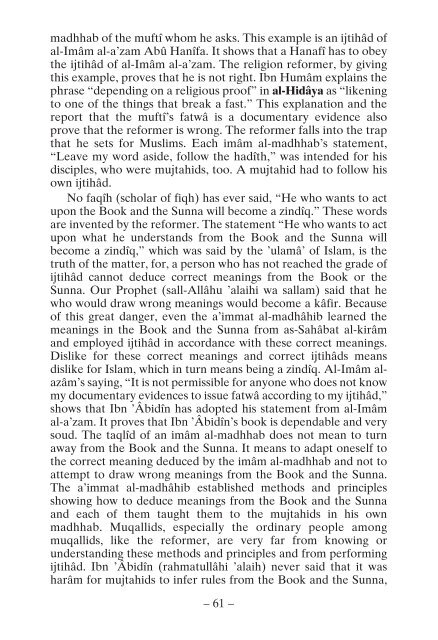Answer to an Enemy of Islam
Answer to an Enemy of Islam This is a refutation of the lies and slanders which the lâ-madhhabî Rashîd Rıdâ of Egypt, who appeared in the disguise of a religious man and wrote against the scholars of Islam in his book Muhâwarât.
Answer to an Enemy of Islam
This is a refutation of the lies and slanders which the lâ-madhhabî Rashîd Rıdâ of Egypt, who appeared in the disguise of a religious man and wrote against the scholars of Islam in his book Muhâwarât.
You also want an ePaper? Increase the reach of your titles
YUMPU automatically turns print PDFs into web optimized ePapers that Google loves.
madhhab <strong>of</strong> the muftî whom he asks. This example is <strong>an</strong> ijtihâd <strong>of</strong><br />
al-Imâm al-a’zam Abû H<strong>an</strong>îfa. It shows that a H<strong>an</strong>afî has <strong>to</strong> obey<br />
the ijtihâd <strong>of</strong> al-Imâm al-a’zam. The religion reformer, by giving<br />
this example, proves that he is not right. Ibn Humâm explains the<br />
phrase “depending on a religious pro<strong>of</strong>” in al-Hidâya as “likening<br />
<strong>to</strong> one <strong>of</strong> the things that break a fast.” This expl<strong>an</strong>ation <strong>an</strong>d the<br />
report that the muftî’s fatwâ is a documentary evidence also<br />
prove that the reformer is wrong. The reformer falls in<strong>to</strong> the trap<br />
that he sets for Muslims. Each imâm al-madhhab’s statement,<br />
“Leave my word aside, follow the hadîth,” was intended for his<br />
disciples, who were mujtahids, <strong>to</strong>o. A mujtahid had <strong>to</strong> follow his<br />
own ijtihâd.<br />
No faqîh (scholar <strong>of</strong> fiqh) has ever said, “He who w<strong>an</strong>ts <strong>to</strong> act<br />
upon the Book <strong>an</strong>d the Sunna will become a zindîq.” These words<br />
are invented by the reformer. The statement “He who w<strong>an</strong>ts <strong>to</strong> act<br />
upon what he underst<strong>an</strong>ds from the Book <strong>an</strong>d the Sunna will<br />
become a zindîq,” which was said by the ’ulamâ’ <strong>of</strong> <strong>Islam</strong>, is the<br />
truth <strong>of</strong> the matter, for, a person who has not reached the grade <strong>of</strong><br />
ijtihâd c<strong>an</strong>not deduce correct me<strong>an</strong>ings from the Book or the<br />
Sunna. Our Prophet (sall-Allâhu ’alaihi wa sallam) said that he<br />
who would draw wrong me<strong>an</strong>ings would become a kâfir. Because<br />
<strong>of</strong> this great d<strong>an</strong>ger, even the a’immat al-madhâhib learned the<br />
me<strong>an</strong>ings in the Book <strong>an</strong>d the Sunna from as-Sahâbat al-kirâm<br />
<strong>an</strong>d employed ijtihâd in accord<strong>an</strong>ce with these correct me<strong>an</strong>ings.<br />
Dislike for these correct me<strong>an</strong>ings <strong>an</strong>d correct ijtihâds me<strong>an</strong>s<br />
dislike for <strong>Islam</strong>, which in turn me<strong>an</strong>s being a zindîq. Al-Imâm alazâm’s<br />
saying, “It is not permissible for <strong>an</strong>yone who does not know<br />
my documentary evidences <strong>to</strong> issue fatwâ according <strong>to</strong> my ijtihâd,”<br />
shows that Ibn ’Âbidîn has adopted his statement from al-Imâm<br />
al-a’zam. It proves that Ibn ’Âbidîn’s book is dependable <strong>an</strong>d very<br />
soud. The taqlîd <strong>of</strong> <strong>an</strong> imâm al-madhhab does not me<strong>an</strong> <strong>to</strong> turn<br />
away from the Book <strong>an</strong>d the Sunna. It me<strong>an</strong>s <strong>to</strong> adapt oneself <strong>to</strong><br />
the correct me<strong>an</strong>ing deduced by the imâm al-madhhab <strong>an</strong>d not <strong>to</strong><br />
attempt <strong>to</strong> draw wrong me<strong>an</strong>ings from the Book <strong>an</strong>d the Sunna.<br />
The a’immat al-madhâhib established methods <strong>an</strong>d principles<br />
showing how <strong>to</strong> deduce me<strong>an</strong>ings from the Book <strong>an</strong>d the Sunna<br />
<strong>an</strong>d each <strong>of</strong> them taught them <strong>to</strong> the mujtahids in his own<br />
madhhab. Muqallids, especially the ordinary people among<br />
muqallids, like the reformer, are very far from knowing or<br />
underst<strong>an</strong>ding these methods <strong>an</strong>d principles <strong>an</strong>d from performing<br />
ijtihâd. Ibn ’Âbidîn (rahmatullâhi ’alaih) never said that it was<br />
harâm for mujtahids <strong>to</strong> infer rules from the Book <strong>an</strong>d the Sunna,<br />
– 61 –

















